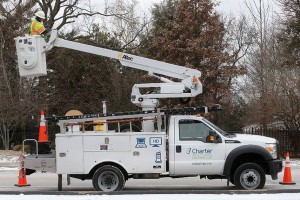Charter Communications has sued the local government in Louisville to Jefferson County to stop a new ordinance that will offer Google Fiber access to the utility poles. Charter wishes to stop Louisville Metro’s One Touch Make Ready ordinance that allows new entrants like Google Fiber to make all the necessary adjustments on the utility poles, instead of sending work crews to move their own wires.
The complaint filed by Charter in the District Court of Louisville is similar to the one that was filed by AT&T last month. Charter claims that this ordinance violates the Fifth Amendment property rights and can lead to service outages for their customers if the Google Fiber installers make any mistake.
Charter is second among the cable TV providers in the US and they are frustrated with both AT&T and Google Fiber facing lesser restrictions in their TV franchise agreement. They even say that the differential treatment violates the First Amendment right to “speak” as a cable service provider, but they have not pointed out any specific “speech” that is suppressed by the action of Google.
Charter started to work in Louisville after they acquired Time Warner Cable and are offering their services under the terms of a franchise agreement with Louisville that expired back in 2010, saying that Louisville refused to rewrite a new deal.
It is not uncommon for cities to be less strict on the franchise agreement to the new entrants that those who are already established in the business. Charter argues that this disparity in the county of Louisville violates their First Amendment speech rights, but they do not claim that they have been prevented from making a speech.
The different rule in each of the franchise agreement makes it “less burdensome and expensive for [Charter’s] competitors to speak in Louisville,” violating the principle that “the government may not favor one similarly situated member of the press or other speaker over another without special justification,” Charter argued.
The “burdensome regulatory treatment” faced by Charter impairs its “ability to speak relative to Google’s and AT&T’s ability to speak,” the complaint said.







